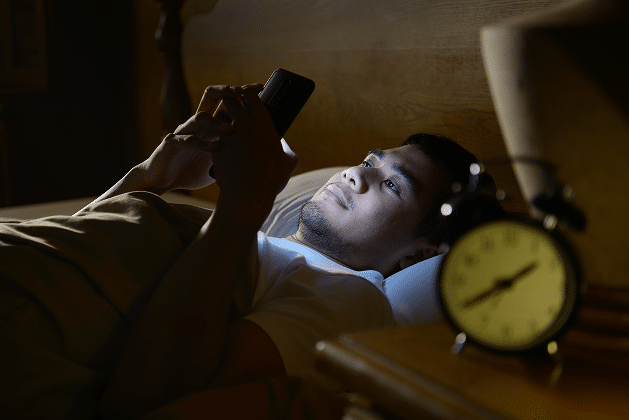- Admissions
- Insurance
- What We Treat
-
- Our Approach
-
- Cost
- Locations
-
- About Us
- Contact Us
- Admissions
- Insurance
- What We Treat
- Our Approach
- Cost
- Locations
- About Us
- Contact Us


The general consensus has been that with an increased use of social media, comes low self-esteem, skewed body image, FOMO (fear of missing out), increased eating disorders and more.2 The issue is the misuse of social media, the comparison of one person’s highlight reel of his or her life, being internalized and compared to another young person’s perception of self.
According to one study, “Cultural trends contributing to an increase in mood disorders and suicidal thoughts and behaviors since the mid-2000s, including the rise of electronic communication and digital media and declines in sleep duration, may have had a larger impact on younger people, creating a cohort effect.”3 In another, more recent study, 5395 individuals “reported that use of Snapchat, Facebook, or TikTok were more likely to report increased levels of depressive symptoms on a later survey.”4
These days, social media sites have become increasingly entangled in our society and all social interactions. It would be difficult, and likely unrealistic, to remove them altogether. Even in the case of Linkedin, a professional social networking site, social media use is linked to increased levels of depression and anxiety.5 Research shows that for the sake of teen mental health, there need to be guidelines in place to ensure that social media is being used properly, rather than as a tool for self-harm, communities of common distorted self image, or self-harm.6 Community guidelines, mental health resources, and awareness campaigns are constructive to the proper use of social media.
We accept most major insurance providers and can check your coverage levels for you.
If we are not an appropriate provider for care, we will assist in finding a care provider that can help.
General Inquiry Form
"*" indicates required fields


By submitting this form you agree to the terms of use and privacy policy and give my express written consent for AMFM Healthcare to contact me at the number provided above, even if this number is a wireless number or if I am presently listed on a Do Not Call list.
I understand that I may be contacted by telephone, email, text message or mail regarding my disability benefit case options and that I may be called using automatic dialing equipment. Message and data rates may apply. My consent does not require purchase. Message frequency varies. Text HELP for help. Reply STOP to unsubscribe.
Contact From Admission Representative:
Complete the form to receive a prompt call back from a member of our experienced and compassionate admissions staff. All communication is 100% confidential.

By submitting this form you agree to the terms of use and privacy policy and give my express written consent for AMFM Healthcare to contact me at the number provided above, even if this number is a wireless number or if I am presently listed on a Do Not Call list.
I understand that I may be contacted by telephone, email, text message or mail regarding my disability benefit case options and that I may be called using automatic dialing equipment. Message and data rates may apply. My consent does not require purchase. Message frequency varies. Text HELP for help. Reply STOP to unsubscribe.

There are a variety of different antidepressant medications that have been proven as effective treatment (in combination with psychological treatment) for depression. Some types of antidepressants are listed here, but inquire with a licensed medical professional or psychiatrist for detailed information on different treatments. Never take psychiatric medication unless it is prescribed to you, and be sure to consult with medical professionals in case of external risk factors.
Selective Serotonin Reuptake Inhibitors (SSRIs) and Serotonin-Norepinephrine Reuptake Inhibitors (SSNIs) are antidepressant medications that treat different neurotransmitters in order to block the reabsorption of serotonin or norepinephrine, keeping more of the chemicals in the synaptic cleft. Both are effective treatments for depression, but depend upon the individual, and should be approached with medical guidance and professional advice. Click here to learn more about the importance of medication management in psychiatry.
Yes, most health insurance companies provide some form of coverage for depression treatment. This often includes both inpatient and outpatient care, depending on your symptoms. Coverage generally applies to therapy, counseling, and medication management services. Your plan may have limitations, exclusions, or required authorizations.
We encourage you to verify your coverage with AMFM Mental Health Treatment to understand the full scope of your benefits. This is especially true if you’re looking for specific treatments, like postpartum depression treatments or persistent depressive disorder treatment options.
"*" indicates required fields


By submitting this form you agree to the terms of use and privacy policy and give my express written consent for AMFM Healthcare to contact me at the number provided above, even if this number is a wireless number or if I am presently listed on a Do Not Call list.
I understand that I may be contacted by telephone, email, text message or mail regarding my disability benefit case options and that I may be called using automatic dialing equipment. Message and data rates may apply. My consent does not require purchase. Message frequency varies. Text HELP for help. Reply STOP to unsubscribe.

By submitting this form you agree to the terms of use and privacy policy and give my express written consent for AMFM Healthcare to contact me at the number provided above, even if this number is a wireless number or if I am presently listed on a Do Not Call list.
I understand that I may be contacted by telephone, email, text message or mail regarding my disability benefit case options and that I may be called using automatic dialing equipment. Message and data rates may apply. My consent does not require purchase. Message frequency varies. Text HELP for help. Reply STOP to unsubscribe.

AMFM Mental Health Treatment Center offers specialized mental health and depression treatment across multiple locations. Our California, Virginia, and Washington locations offer you or your loved one mental health programming and mental health crisis services at the highest level of care. We provide comprehensive case management, a variety of therapies, behavioral health services, and a safe and supportive environment for wellness. We are strategically placed to provide accessible, high-quality care tailored to your needs. To find out more about our facilities, contact us today. Explore our locations below to find the one nearest to you.
AMFM’s California treatment centers are located up and down the coast of Southern California, from the greater Los Angeles area, to Orange County, down to San Diego. Our inpatient mental mental health treatment program locations are: Fallbrook, Carlsbad, Lake Forest, Dana Point, San Juan Capistrano, Laguna Hills, and Laguna Nigel. For personalized support and for insurance verification, contact us today.
If you’re searching for mental health treatment options in Virginia, AMFM’s mental health treatment programs are available in Fairfax Station, Vienna, and Great Falls, VA.These locations in Virginia are qualified to assist with depression treatment and to meet your needs.
AMFM Mental Health Treatment Center offers outpatient mental health treatment programs in Washington, conveniently located at 6900 East Green Lake Way N, Suite G, Seattle, WA 98115. A Mission For Michael Mental Health Treatment has one location in the state, providing dedicated and comprehensive mental health care for lasting well-being.
Bounds, Dawn. “Social Media’s Impact on Our Mental Health and Tips to Use It Safely.” UC Davis Health, UC Davis Health, 10 May 2024, health.ucdavis.edu/blog/cultivating-health/social-medias-impact-our-mental-health-and-tips-to-use-it-safely/2024/05.
Nawaz FA, Riaz MMA, Banday NUA, Singh A, Arshad Z, Derby H, Sultan MA. Social media use among adolescents with eating disorders: a double-edged sword. Front Psychiatry. 2024 Feb 9;15:1300182. doi: 10.3389/fpsyt.2024.1300182. PMID: 38404474; PMCID: PMC10884122.
Twenge, J. M., Cooper, A. B., Joiner, T. E., Duffy, M. E., & Binau, S. G. (2019). Age, period, and cohort trends in mood disorder indicators and suicide-related outcomes in a nationally representative dataset, 2005–2017. Journal of Abnormal Psychology, 128(3), 185–199. https://doi.org/10.1037/abn0000410
Perlis RH, Green J, Simonson M, Ognyanova K, Santillana M, Lin J, Quintana A, Chwe H, Druckman J, Lazer D, Baum MA, Della Volpe J. Association Between Social Media Use and Self-reported Symptoms of Depression in US Adults. JAMA Netw Open. 2021 Nov 1;4(11):e2136113. doi: 10.1001/jamanetworkopen.2021.36113. PMID: 34812844; PMCID: PMC8611479.
Jones JR, Colditz JB, Shensa A, Sidani JE, Lin LY, Terry MA, Primack BA. Associations Between Internet-Based Professional Social Networking and Emotional Distress. Cyberpsychol Behav Soc Netw. 2016 Oct;19(10):601-608. doi: 10.1089/cyber.2016.0134. PMID: 27732077; PMCID: PMC5067824.
Bains N, Abdijadid S. Major Depressive Disorder. [Updated 2023 Apr 10]. In: StatPearls [Internet]. Treasure Island (FL): StatPearls Publishing; 2025 Jan-. Available from: https://www.ncbi.nlm.nih.gov/books/NBK559078/
Maurya, Chanda, et al. “The Effects of Cyberbullying Victimization on Depression and Suicidal Ideation among Adolescents and Young Adults: A Three Year Cohort Study from India – BMC Psychiatry.” BioMed Central, BioMed Central, 9 Sept. 2022, bmcpsychiatry.biomedcentral.com/articles/10.1186/s12888-022-04238-x#Sec10.

Corporate Office:
30310 Rancho Viejo Rd.
San Juan Capistrano CA 92675
Fax: 949-421-6977
Email: info@amfmhealthcare.com
Copyright 2025 © A MISSION FOR MICHAEL
All rights Reserved | Privacy Policy | Terms of Use